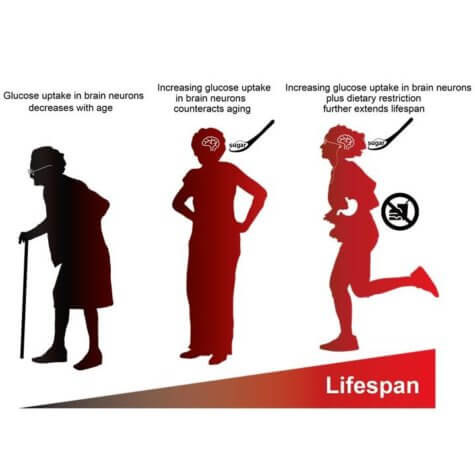TOKYO — Diet experts usually say cutting out sugar can help with weight loss and improve health. A new study from Japan, however, finds how our bodies use substances like glucose may be more important than cutting them out all together. Researchers from Tokyo Metropolitan University say improving glucose uptake can significantly increase lifespans in fruit fly experiments. For humans, better glucose uptake in the brain may be the key to living longer and healthier lives.
Study authors say older flies with better glucose uptake are able to compensate for the reduced motor function that naturally comes with age. This led to the insects leading longer lives in the experiment. When combining this with a better diet, researchers suggest this can lead to enhanced lifespans in older humans.
How feeding the brain can feed your lifespan
When it comes to energy, the study finds the brain is a very power-hungry organ. It consumes 20 percent of the oxygen and a quarter of the glucose your body takes in.
To keep everything powered, the body uses glucose (a simple sugar) to create adenosine triphosphate (ATP). These are “energy couriers” throughout the body which form through a process called glycolysis.
As people age, brain cells become less capable of making ATP. Researchers say there is also a link between less ATP and less glucose coming into the body. Although health experts may recommend watching how much we eat as we age, the study suggests more food and more glucose may actually help fuel this ATP process.
On the other hand, the Japanese team still acknowledges that a healthy diet also leads to a longer life. Their experiment tried to find the balance between these two competing philosophies.
Using glucose better

Tokyo Metropolitan University)
Associate Professor Kanae Ando and her team examined the body’s ability to convert glucose to ATP using Drosophila fruit flies. First, they confirmed that older flies have lower levels of ATP in their brain cells and a lower glucose uptake as well.
Their study discovered that the cause was older flies having fewer enzymes needed for glycolysis. The team genetically modified flies to produce more glucose-transporting proteins called hGut3. The results reveal having more of these particular proteins significantly increases the number of ATP in the cells.
Additionally, the team discovered having more hGut3 present helps to slow the decrease in glycolysis enzymes that occurs during old age. Although this did not stop the normal damage which takes place in the cells as organisms age, the fruit flies suffered from fewer problems with their motor functions thanks to better glucose uptake.
Balancing in a better diet
In a second part of the experiment, the team also put the flies with better glucose uptake on a restrictive diet. Those flies enjoyed even longer lifespans.
Researchers find that increasing glucose uptake in the body did not actually send more glucose to the brain cells. Instead, Ando and the team believe improving glucose uptake helps the body use the glucose it consumes more efficiently. This in turns helps the brain to make the energy it needs to keep functioning for years and years.
The study appears in the iScience.
